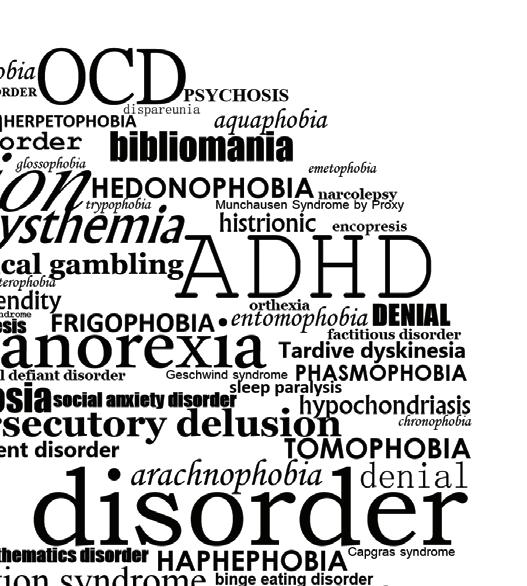
4 minute read
Community, Culture, and Mental Health
By Dr. Doris Vaughan
Mental health has become highlighted in the media as a topic of much discussion in the context of the Corona Virus global pandemic and the personal anxiety and depression struggles experienced by elite athletes during the Olympic games. The need to attend to mental health has become popular, as evidenced by the many therapy companies suddenly populating the landscape of healthcare. Despite its popularity, lack of access to mental health care parallels lack of access to medical care, economic resources, and civil rights for those members of society who are poor, disenfranchised, and labelled as minorities.
In light of this renewed interest in mental health, the definition of mental health has come under much scrutiny. The former perspectives of mental health included the absence of mental illness, as well as; the presence of positive emotional experiences towards life. Mental health is now viewed more wholistically with allowances for values, culture, and social background.
According to the World Health Organization (WHO) mental health is “a state of wellbeing in which the individual realizes his or her own abilities, can cope with the normal stresses of life, can work productively and fruitfully, and is able to make a contribution to his or her community”. A proposed more current definition of mental health published by the National Institute of Mental Health (NIMH) purports that “mental health is a dynamic state of internal equilibrium which enables individuals to use their abilities in harmony with universal values of society…”
Every person knows someone who is coping with mental health challenges whether in response to the pandemic or a normal stressor that is part of the human condition. The lack of access to mental health care for all people presents an unaddressed ill of today’s society. African Americans and Indians, as well as other cultures, have a rich history of forced resilience and traditions that can diminish today’s negative-impacts of inequitable access to care.
African American culture has an aura of celebration even during the worst of times. Historically, rituals and traditions were a staple in preserving mental health in African American communities. They persevered through gross and overt oppression, such as SCLC National Magazine/ Fall 2021 Issue 31


slavery. Present day insidious practices of racism and coping with the pandemic commands a return to the collectivistic and resilient spirit of our culture.
The continuance of mental health is becoming more and more challenging. This in part is attributed directly to the pandemic where our lifestyles have been altered, isolation is a safety measure, many lives have been loss, and our traditional practices around death, funerals, and bereavement are no longer possible.
A second barrier to mental health is living in a world of technology where community and human interaction is watered down to various virtual platforms for work, online religious services, healthcare, and socialization. Our normal ways of coping has failed for living with the stressors of modern society. The invention of the internet has created of culture of instant-gratifi cation mentality, however; this way of thinking is in juxtaposition to mental health. Achieving and maintaining mental health is an ongoing journey throughout one’s lifetime. The separation between mental health and well-being and mental unwellness is perpetually one negative life experience away.


Losses are often the catalyst and tipping points for immersion into a mental health crisis or state of being mentally unwell. There is a heightened sensitivity to stressors resulting from the pandemic, leaving many people struggling with anxiety and depression with resultant isolation and hopelessness.
The loss of a loved is devastating for many during this pandemic. Other pandemicinspired losses that have a negative impact on mental health include socioeconomic factors, political issues, identity crises, health concerns, and so forth.
Though simplistic, coming together around community and culture remains vital to mental health. The National Institutes of Health (NIH) instructs that “social connections might help protect health and lengthen life. Scientists are fi nding that our links to others can have powerful eff ects on our health – both emotionally and physically”.
Revisiting our forefathers cultural approach to life with an aura of celebration can bolster mental health and well-being. Mindfulness, meditation, prayer, and having gratitude are mentally healthy practices. Safely seek community by re-instituting cultural practices around food, music, and celebrations (adhering to COVID and standard precautions).
Consider joining online support groups and social groups with others who have similar interests. Educate, improvise, compromise, and creativity are tools our ancestors used for their mental
health and survival. Educate oneself on emotions and emotional regulation for the achievement of mental health and wellbeing, despite circumstances. Lastly, encourage the services of a professional mental health provider or organization when deemed necessary.
All of life in interconnected and the realization of a more mentally healthy existence can be found in the interrelatedness of community, culture, and mental health. The creation of joy despite circumstances is a rich part of our heritage. African American’s cultural aura of celebration can be a conduit for the sustenance of mental health that helps to close the gap of lack of access.

At Novartis, we harness the innovation power of science to address some of society’s current and historically challenging healthcare issues and disparities. Our researchers work to push the boundaries of science, broaden our understanding of d disiseaeas se es s a an nd d dedevevel lo op p n no ovevel l prpro od ducuct ts s i in n a ar re ea as s of great unmet medical need. We are passionate about discovering new ways to extend and improve the lives of people across the globe.









